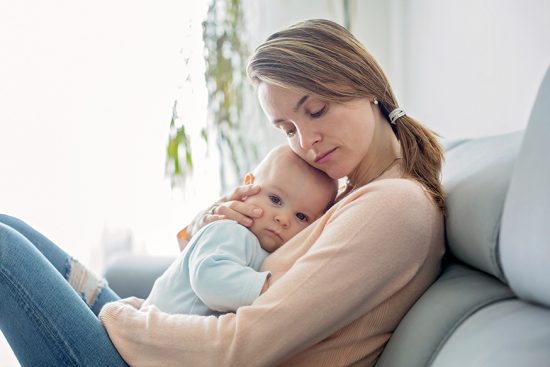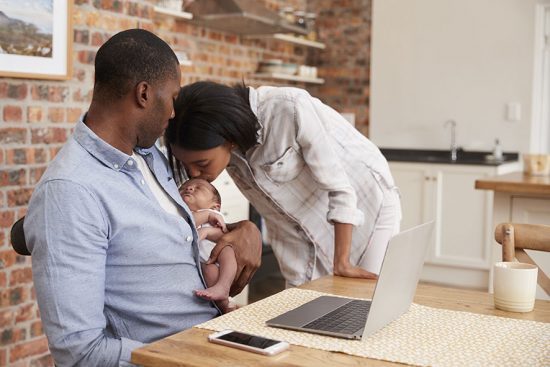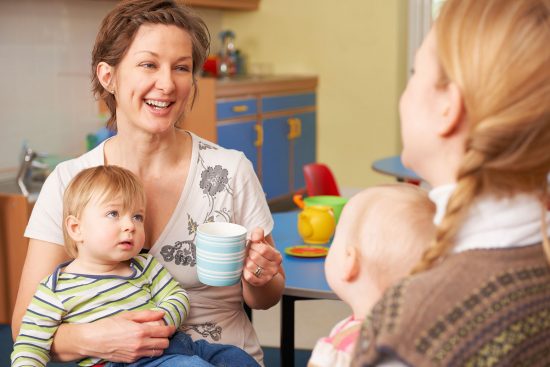Lack of sleep and worries about your baby are pretty common among new parents. But what do you do when someone you know just doesn’t seem like themself? Read our tips to find out how you can help.

You’re knackered, your hormones are all over the place and you’re overwhelmed by responsibility. It’s all par for the course when you’ve recently had a baby, and it’s why your NCT friends, the ones who are going through exactly the same thing at exactly the same time, are so crucial.
But what happens if one of those mates seems to be struggling a bit more than the others? It’s possible that they could be suffering from postnatal depression (PND) or another mental health issue, like anxiety or post-traumatic stress disorder (PTSD).
And we’re not just talking about women here – men can suffer from PND too, so watch out for signs in your partner or among your friendship group.
‘Sleep while the baby sleeps’ is one of the most annoying clichés new parents hear. If only it was so easy, eh? Particularly when you have an endless flow of visitors to entertain AND a laundry basket full of seemingly multiplying baby socks.
But if you have a friend who’s really struggling to get their head down, or even mentions that they’ve been having vivid nightmares, it could be a symptom of PND.
There are a range of symptoms that might occur which can be under-recognised.

Withdrawing from friends or other people can be a symptom of PND. You could help by offering to entertain your their baby along with yours for a couple of hours while they get some rest.
They might not be able to sleep, but just the time out and the kindness of your gesture will help them feel less overwhelmed, and give them time to reflect on how they’ve been feeling. PND is an illness, so depending on the degree of their symptoms, you might have to suggest they or their partner get professional help from healthcare providers to treat it.
It’s hard to eat a well-balanced diet when you’ve just had a baby, when your normal routine has gone out of the window. But eating habits and mental health are highly intertwined, with many people either comfort eating or, at the opposite end of the scale, experiencing loss of appetite when they’re depressed or anxious.
If you’ve spotted that your friend is displaying some eating habits that worry you, try and have a chat with them. The focus doesn’t have to be about food, but maybe start the conversation with how you’ve noticed they haven’t quite been themselves lately.
It is really important that PND is diagnosed and treated properly, as if left untreated the symptoms will only increase
It could well be the case that they don’t want to discuss it with you because they’re worried about being perceived as a bad parent. But if you’re a good friend and give them emotional support, they might share their feelings and situation with you.
You could also sensitively broach it with their partner, who may be taking charge of food during the early days. Since they’re probably feeling pretty overwhelmed too, they might not be prioritising healthy eating.
It’s really hard to not feel like you’re interfering. But just by mentioning that you’re a bit worried and asking them if your friend’s been eating OK at home could be enough for them to take action. It is really important that PND is diagnosed and treated properly, as if left untreated the symptoms will only increase.

If you’ve got a gaggle of friends who get together en masse, it can be hard to have a proper chat. Conversation threads are often left unfinished due to badly-timed baby meltdowns or unexpected nappy incidents.
Plus, less outgoing personalities can find themselves drowned out by all the chatter. But if one friend seems to be chipping in even less than usual, keep an eye on them. One of the symptoms of PND includes withdrawing from conversation with other people.
You could always message them afterwards and say: ‘Feel like I hardly got the chance to talk to you! How are things?’ or even arrange a one-on-one meet-up to see how they’re doing.
If they’re struggling with their mental health, they might find it easier to open up away from a noisy group.
You could suggest a walk in the park, or taking part in an NCT Walk & Talk near you
Looking after a baby can be a very isolating time, and having a group of supportive friends that you can meet up with your baby can go a long way to restore your sense of well-being. Have you noticed that a friend has been making excuses not to join you?
You could help by offering alternatives to big group meets. Exercise has been shown to have a positive impact on mental health. You could suggest a stroll in the park or even joining an NCT Walk & Talk – take a look at this page to see if there’s one near you. Alternatively, you could go along to a postnatal exercise class together such as yoga.
It’s totally normal to worry about everything from your newborn’s body temperature to the colour of their poo. But, in parents suffering from PND and/or anxiety, these concerns can be heightened to the point that they’re crippled by them. This can lead to being scared to do things that wouldn’t normally bother them, such as taking their little one out to the shops.
Maybe your friend seems to be obsessing about their baby’s well-being, or taking a lot of trips to the doctors about what seem like small things. It’s worth bringing it up with them directly – initially by reassuring them about what a wonderful, caring person they are and saying that you totally understand how scary it is suddenly being responsible for a tiny human. They may be feeling that they are unable to look after their baby so your reassurance and encouragement could help.

Get them chatting – and always encourage them to seek professional help if they could be experiencing PND.
Many people put on their ‘happy face’ at baby groups for fear of being judged or labelled a bad parent if they share their true worries and fears.
Recent research suggests that social support from people who share similar experiences can have a positive impact on someone’s parenting experiences, and subsequently their mental health and wellbeing.
The more we talk openly and honestly about our mental health, the more chance we have of getting support. And who better is there than your fellow parent mates to turn to?
When you’re concerned about a friend’s well-being, it is very easy to let your own come second. Make sure that you are taking care of yourself and accessing the support you have available to you. After all, to look after other people you’ve got to look after yourself as well.
Read more about mental health and feelings after birth here.
Our support line offers practical and emotional support with feeding your baby and general enquiries for parents, members and volunteers: 0300 330 0700.
You might find attending one of NCT’s New Baby groups helpful as they give you the opportunity to explore different approaches to important parenting issues with a qualified group leader and other new parents in your area.
Our Parents in Mind service offers emotional support for parents who are experiencing low mood, anxiety or poor mental health during pregnancy or within the first two years of birth. See if it’s available in your area.
Mind, a leading mental health charity, provides information on a range of mental health topics including postnatal depression and has an infoline for support: 0300 123 3393.
#PNDHour is an online peer support group that runs every Wednesday at 8pm via the Twitter account @PNDandMe. Anyone can join in to discuss topics about antenatal and postnatal depression, such as self-care, medication and seeking help. It’s run by Rosey who also blogs about her own experiences with antenatal and postnatal depression, as well as raising awareness of perinatal mental illness, at PND and me.